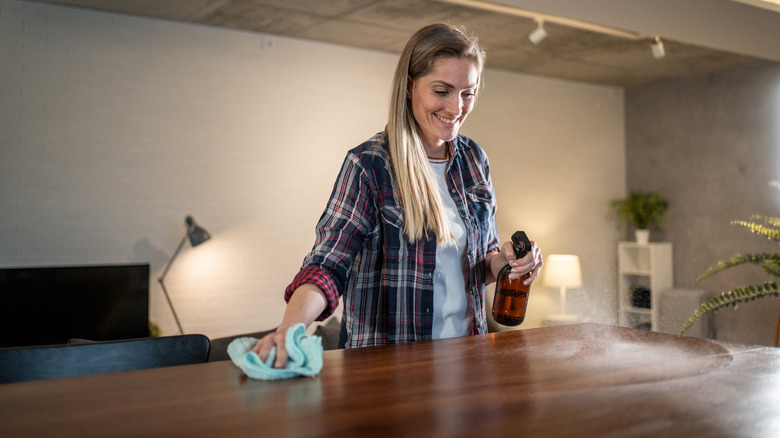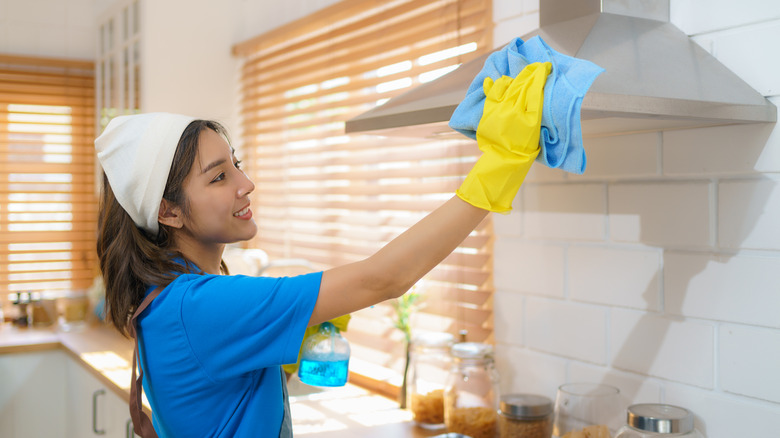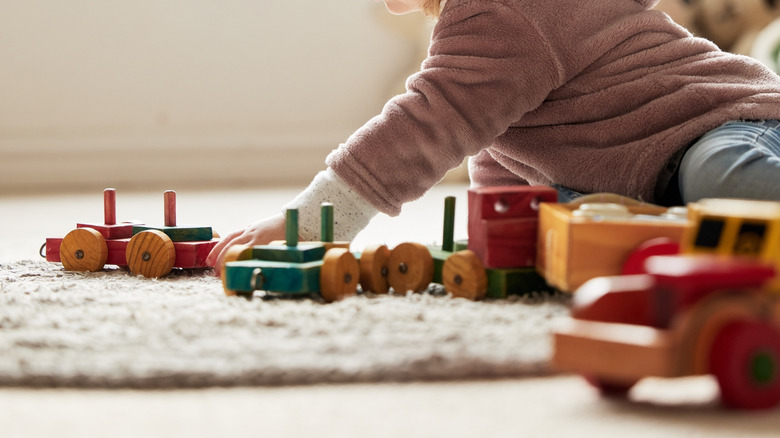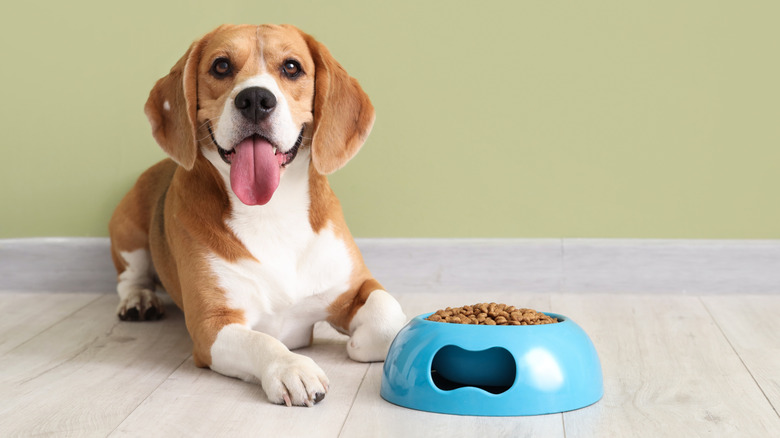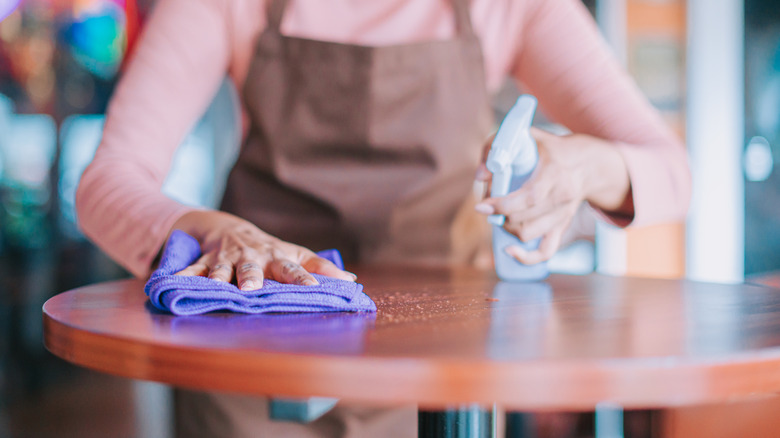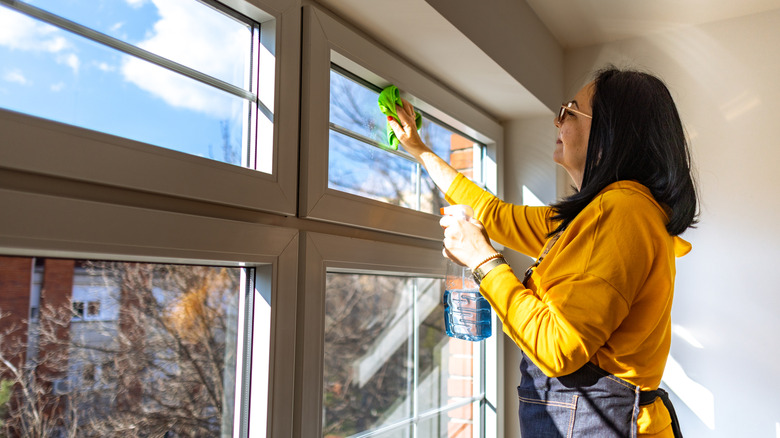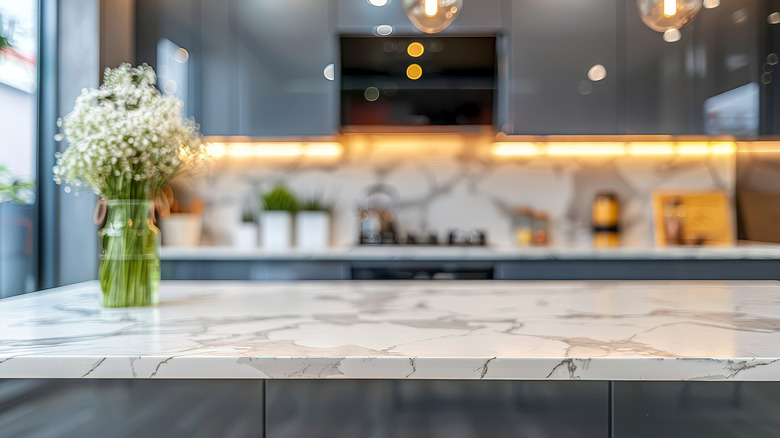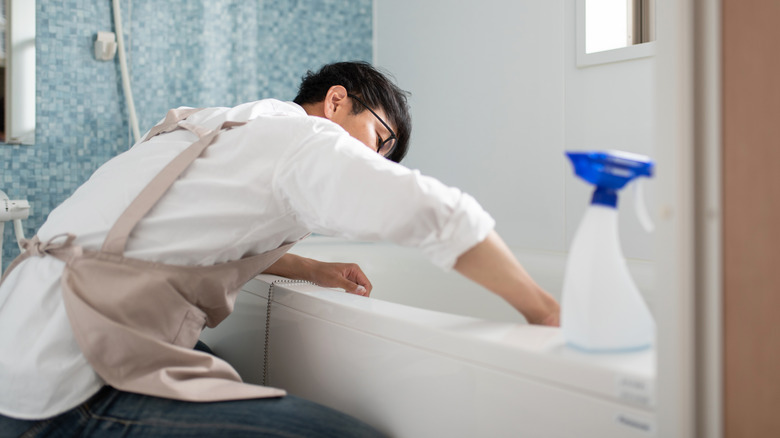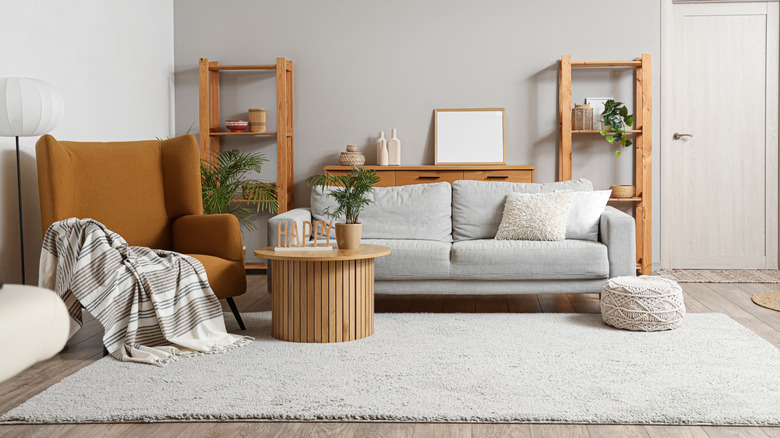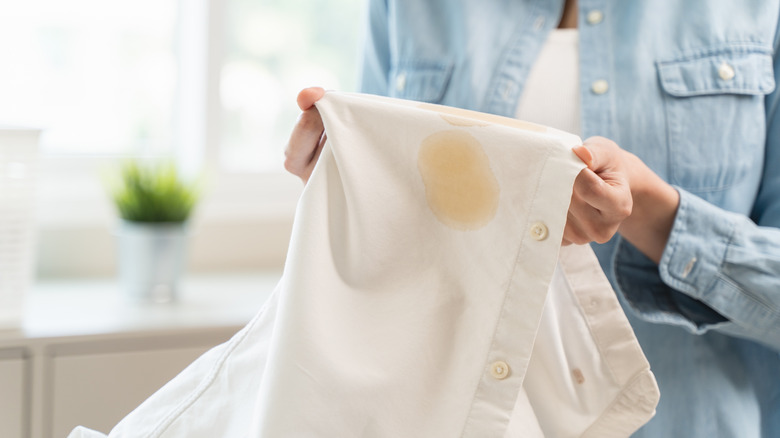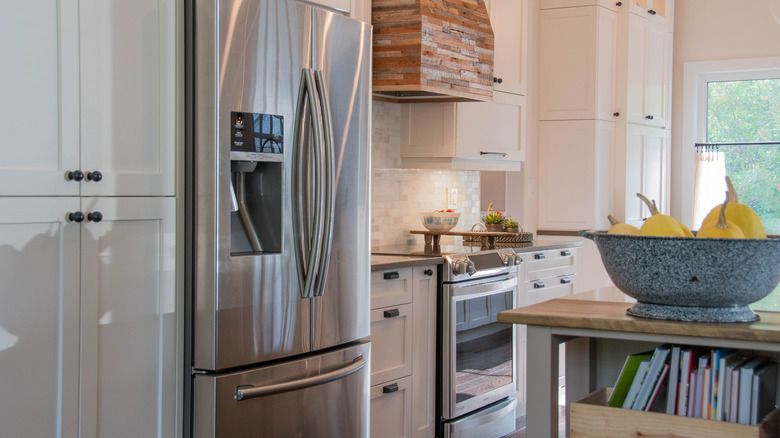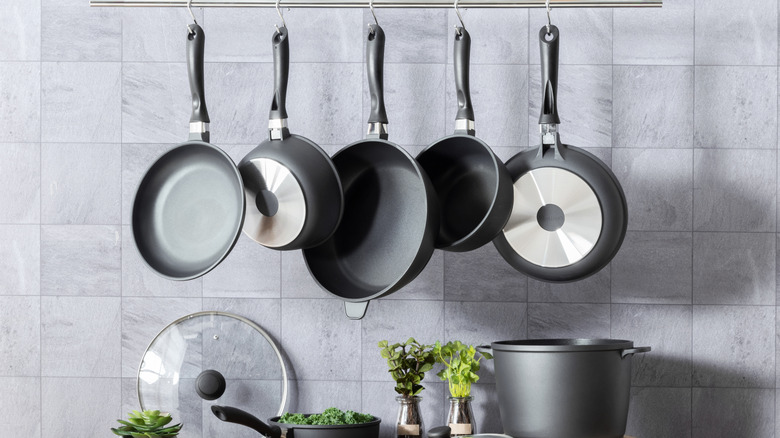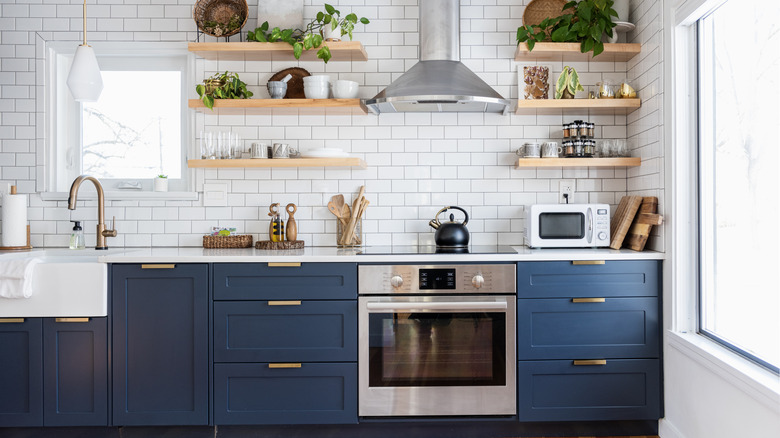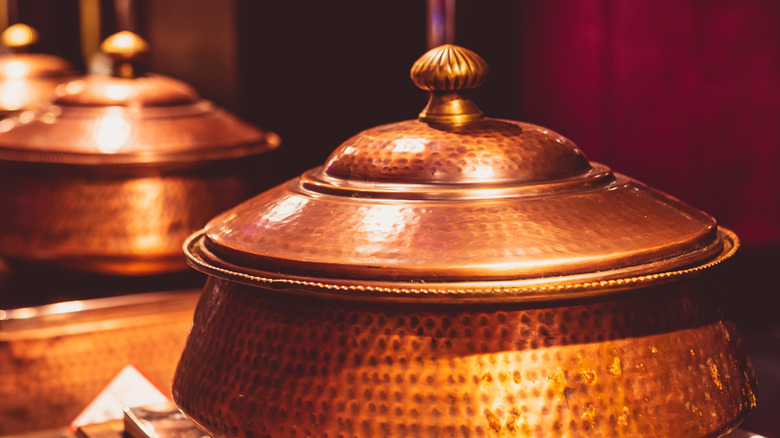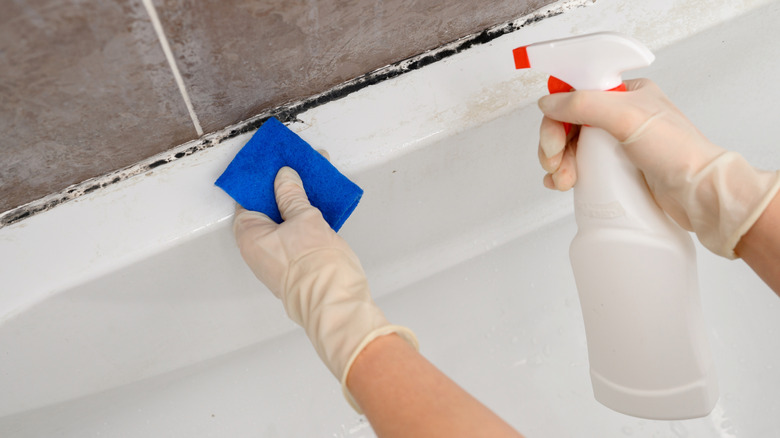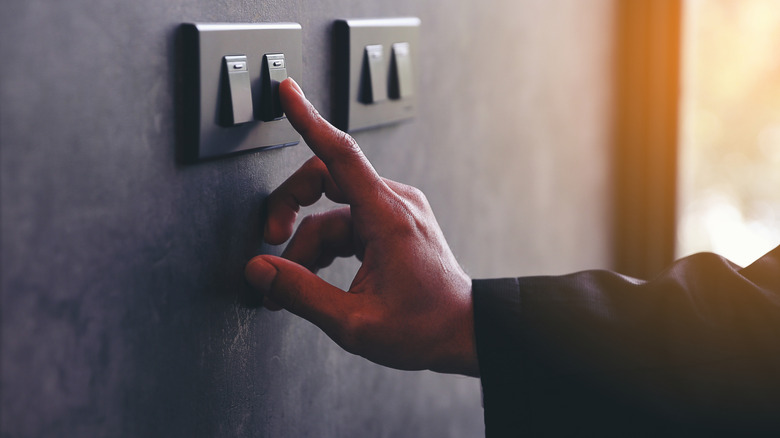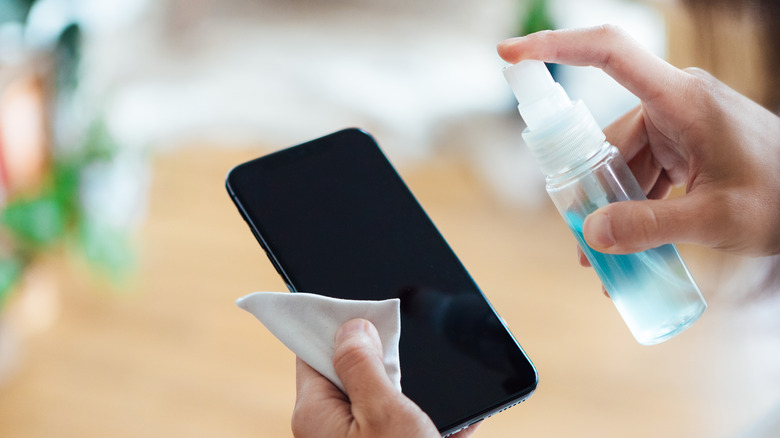17 Things You Should Never Clean With All-Purpose Cleaner
We may receive a commission on purchases made from links.
Buying 20 different cleaners for each area of your home can be headache-inducing. Besides having to memorize which product does what, you'll also have to spend a considerable sum upfront. This is where an all-purpose cleaner shines. It works on multiple surfaces, including your counters, floors, and sinks, without issues. Despite the benefits, it's not a miracle worker, and you shouldn't take the "all" in its name literally. This is because there are several things you shouldn't use these cleaners on.
For starters, your electronic devices will not appreciate it if the moisture from an all-purpose cleaner makes its way inside. Similarly, glass surfaces will look untidy with all the streaks marring their crystal-clear shine. Your children's toys and pet food bowls are other items you should never use these cleaners on, since you don't want them to fall sick from any lingering product. These cleaners will even discolor your expensive rugs and precious carpets, turning them into an eyesore. Wood and natural stone surfaces don't like these cleaners much, either. Want to know about more items you shouldn't use them on? Here are 17 things that fare or clean better in the absence of an all-purpose cleaner. We've also included alternatives to make it easier for you to clean them.
Range hood
The range hood is an important kitchen appliance that sucks up the grease and smoke produced during your cooking sessions. It also falls prey to tiny food particles that stick to it without shame. Now, if you wipe the hood regularly, an all-purpose cleaner can help maintain it. However, it can't work through stubborn grease coatings clinging to your range hood. This is why you should always combine a few drops of a mild dish soap with a little warm water to degrease it. Or, mix baking soda and vinegar to tackle tough messes.
Children's toys
If your kids tend to chew their toys or coat them in their saliva, you'd be better off steering clear of all-purpose cleaners. This is because they contain chemicals that aren't safe for consumption. So, hand clean them using a mild detergent or dish soap. Go with hot water to take care of the lingering germs. Remember to clean battery-operated or delicate pieces according to the manufacturer's instructions. Or, put them in the washing machine or dishwasher if their care label allows. In case you can't find one, stick to washing them by hand since certain materials like rubber can melt from your dishwasher's high heat.
Pet food and water bowls
Your pet's food and water bowls are among the things you should be cleaning in your house every day. This will keep disease-causing microbes at bay. However, avoid wiping them with all-purpose cleaners. Just like you don't want your children to consume chemicals, you don't want your pets to fall sick after licking a bowl containing traces of the cleaning solution. So, make it a point to always wash your dog's food and water bowls with a mild dish soap and hot water. Try soaking the dishes in the soap and water solution if you're dealing with stuck food matter.
Wood floors and furniture
Keep your all-purpose cleaners away from your wood floors and furniture to keep their finish intact. This will leave your finished surfaces vulnerable. The chemicals might even discolor or distort unfinished wood surfaces. So, to ensure your wood floors and furniture last long, always use a dedicated cleaner, like Method's Plant-Based Daily Wood Cleaner, to keep them looking new. Alternatively, use olive oil to remove dust and shine your wood tables and shelves. As for your wood flooring, rely on dish soap and a microfiber mop (avoid steam as heat can cause damage).
Glass surfaces
Oily makeup marks on your mirrors, dirt on your window panes, and smudges on your goldfish's aquarium will lower the visibility. Plus, they'll make these glass surfaces look dirty. However, don't apply all-purpose cleaner on them if you aren't a big fan of streaks. Instead, use a dedicated glass cleaner, such as Windex Glass and Window Cleaner Spray, for streak-free surfaces. Another way to keep your glass shelves clean is to get a spray bottle and mix distilled white vinegar with water in a 1:1 ratio. Pour in a few drops of dish soap when dealing with greasy smudges.
Natural stone counters
When you shell out $50 to $150 per square foot to have natural stone countertops installed in your home, you wouldn't want to damage them due to your negligence. And that's exactly what will happen if you spray all-purpose cleaners on your marble or granite counters. They might contain bleach or ammonia, or simply have high acid or alkalinity levels. Any of these ingredients can decrease the shine or chip away at the sealant on your natural stone surfaces. So, always use cleaners that are safe for granite and marble. Granite Gold's 32 Ounce Daily Cleaner is a good option.
Bathtub and shower stall
All-purpose cleaners can be helpful if you need something for wiping your bathtub and shower stall on a regular basis. But they aren't a good option when it comes to deep cleaning your bathroom. It's because they can't handle the accumulated soap scum, dislodge the stubborn stains, or tackle the hard water stains with panache. Use a baking soda, water, and dish soap combo on acrylic and porcelain, distilled white vinegar and water on fiberglass, and dish soap and water on stone resin tubs. Or, try out dedicated cleaners like Lysol's Power Foaming Cleaning Spray for Bathrooms.
Upholstered and leather furniture
Your precious upholstered furniture can develop stains or suffer discoloration if you use all-purpose cleaners on it. Since it's one of the items you should think twice before painting, you don't want to risk turning your fabric sofa unsightly. So, get Bissell's Little Green Upholstery Deep Cleaner to keep your couches good as new. Get Rain-X's Blue Coral Upholstery Cleaner to eliminate deep-set stains. Also, keep your all-purpose cleaner away from your leather furniture if you don't want to promote cracks. Invest in Weiman's Leather Cleaner and Conditioner to clean them worry-free.
Carpets and rugs
Similar to how an all-purpose cleaner can lead to pale patches on your upholstered furniture, it can discolor the fibers of your carpets and rugs, too. So, never use it to clean your dirty runners. Rent a steam carpet cleaner from your local hardware store to keep your carpets and rugs in tip-top condition. But if you're dealing with stains, like those from milk, beer, chocolate, bleach, or pet poop, use different methods to clean common carpet stains. Or, use Resolve's Professional Strength Spot and Stain Carpet Cleaner to get rid of stubborn stains.
Stubborn stains on your laundry
Pre-treating stains is an important step you shouldn't skip before starting a load of laundry. However, reaching for the all-purpose cleaner under your bathroom sink can make matters worse. To avoid such an outcome, always use a paper towel or a white microfiber cloth to blot the stain and remove excess. Then, use a stain-appropriate cleaner. For instance, you'll need to rub in liquid detergent to get rid of organic stains caused by milk, grass, or urine. Greasy stains will benefit from a soak in warm water and detergent solution. Similarly, dirt ones will give way if you dunk them in cold water.
Stainless steel appliances
Although there are multiple all-purpose cleaners worth buying for your kitchen, keep them away from your stainless steel fridge and dishwasher. This is because they leave behind streaks and diminish the shine of your appliances. In case your all-purpose cleaner contains ammonia, citric acid, or bleach, it'll degrade the finish of your stainless steel appliances with repeated use. Considering these cons, dip a microfiber cloth in a mild dish soap and warm water solution and move it along the grain (avoid circular patterns or you'll have to deal with scratches). Weiman's Stainless Steel Cleaner and Polish is a good alternative.
Non-stick pots and pans
Your non-stick pots and pans require gentle care, or their protective coating will begin chipping off, rendering them unfit for use. Since a few all-purpose cleaners contain caustic chemicals, they can be too harsh on your non-stick cookware. So, avoid using them to clean your dirty pots and pans. Allow them to cool down after use, then add a few drops of a mild dish soap onto their surface. Scrub away the grease, oil, and food particles with a gentle scrubber, like Scotch-Brite's Delicate Clean Scrub Sponges, or a microfiber dishcloth.
Oven
Even though an all-purpose cleaner won't put your oven out of commission, it won't do it any favors, either. So, the baked-on grease, burnt food residue, and stuck chocolate chips will continue to decorate its interiors. Since maintaining a clean appliance will help you save money on electricity while using your oven, don't admit defeat when your all-purpose cleaner fails. Instead, get a dedicated solution, like Easy Off's Heavy Duty Oven Cleaner, for quick results. You can even combine ½ cup of baking soda with 3 tablespoons of water if you want an organic cleaner for your appliance.
Copper items
Your decorative copper dishes or old coins won't fare well if you spray them with an all-purpose cleaner. Display them as is if you don't mind the patina over them. Otherwise, take a lemon, cut it in half, squeeze one of them empty, and pour table salt over it with a free hand. Scrub your copper items with the salt-covered lemon and wash them with water. Alternatively, combine distilled white vinegar and water in a 1:1 ratio, adding 1 tablespoon of salt. Dampen a microfiber cloth in the solution and rub it over your tarnished copper dishes and coins.
Mold and mildew
Even if you're diligent about maintaining a clean home, mold and mildew can still set up shop. After all, they're extremely low-maintenance and just need a damp and dark environment to feel right at home. Yet, removing them isn't easy. You need dedicated products, like RMR-86 Instant Mold and Mildew Stain Remover Spray or Lysol's Mold and Mildew Remover Spray with Bleach, manufactured keeping these nasty microbes in mind. This is why an all-purpose cleaner won't be helpful when you're hoping to get rid of mold and mildew from your bathroom, attic, or basement.
High-touch surfaces
An all-purpose cleaner is ideal if you want to clean general surfaces around your house. But it won't get rid of germs effectively. You need a disinfectant to take out the lingering bacteria and viruses on your high-touch surfaces, such as light switches, door handles, intercom, and the like. Clorox's Bleach-Free Disinfecting Wipes are a good option to quickly go over the many switches and door knobs in and around your home. Just ensure the wipes aren't too wet (wring them out gently if they seem wet) while you're rubbing them on your electric switches and turn off the power supply if possible to avoid accidents.
Laptops and smartphones
You host most of your work and personal life on your laptops and smartphones, so, naturally, you wouldn't want to damage them while cleaning them (talk about negative returns!). An all-purpose cleaner might seep into your devices and cause them to malfunction or die unexpectedly. To clean your electronics, plug them out and switch them off. Then, wipe them clean with a dry microfiber cloth. To remove stains and fingerprints, dampen a clean part of the cloth with iO Clean's Screen Cleaner Spray and rub it over your screens. Eveo's Electronic Wipes are a good option, too.
